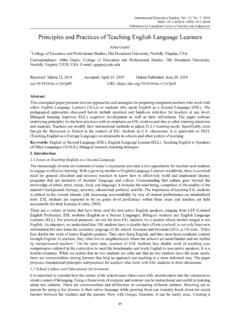Transcription of Practise English on Your Own - immigratemanitoba
1 Practise English on your Own Self-study Ideas for English Language Learners Practise English on your Own: Self-study Ideas for English Language Learners Now that you are living in Manitoba, you have many reasons to improve your English . Communicating in English will help you to be successful at work and in your community. English classes are available for free in Manitoba for permanent residents. You can choose from full-time or part-time classes during the day or evening. However, not everyone can go to English classes. If you are working at a job every day and also taking care of a family, it can be very difficult to take time to go to classes. If you are able to take the time to go to English classes you may also want to learn faster and study at home. For these reasons it is useful to know some strategies for practicing English on your own. There are many ways to learn English outside of the classroom. The ideas you will read about here are from adult EAL teachers and learners.
2 You will find out about some of the many internet websites where you can learn for free as quickly or as slowly as you like. You will also find out more about the Canadian Language Benchmarks and think about what your level of English is right now, and what level you want it to be in the future. Information is also provided about some internationally recognized English language standardized tests. Good luck as you Practise your English communication skills! Ideas for Practising English Here are some ideas for practising English . Some of the ideas come from newcomers to Canada who have learned to speak English . Others come from English language teachers. 1. Make everyone your teacher. When other people are speaking in English , think about how they say something. Repeat what they said silently in your mind. Then repeat what they said quietly to yourself. First say it slowly and clearly, then say it to yourself at the same speed and rhythm as the person you were listening to. You can do this anytime, anywhere when you're with people, while watching a movie, at work, at school the world is your classroom!
3 Don't worry if people think you're crazy, just put on headphones or earbuds while you're talking to yourself and everyone will think you're talking on your cell phone. 2. Talk to people. You could talk about: the weather In Manitoba, it's OK to talk about the weather every day, and many people do this in almost any situation to open a conversation. We create friendships by suffering together! Snow again, I miss summer! Crazy mosquitoes, we need winter! the neighbourhood Hi, I'm your neighbor, I just moved in last week (names, etc ). Have you lived in this area for a long time?..(years, etc.). Seems like a friendly area, I like it . work Do you work close by? What kind of work do you do? your children, your children's' school How old are your kids? What school do they go to? Are you happy with the teachers over there? 3. Ask a workmate to join you for coffee break. Let's get out for coffee sometime, maybe Friday? People like it when you are interested in them. Ask them about: their job How long have you worked here?
4 What do you do? their family Do you have family here? things they like to do So what's up for the weekend? You could talk about: life in your country, your family, your life and goals in Canada, your job, your free-time interests. 4. Make a study group. Meet with other English learners once a week to study together. Do exercises from your English class together or try some of the on-line learning websites recommended in this document. 5. Make an English club. Meet once a week or once a month with other English language learners. You could have a supper club or a movie club. You could go to a park, a museum, or just sit and listen to music together. You could show pictures and talk about your country. Make sure you speak English most of the time, or if you can, all of the time! Challenge yourself at the first meeting to speak only English for 30 minutes, then 60 minutes the next time, then 2. hours the next time. 6. Volunteer. Go to a community centre or your children's school.
5 Ask if you can volunteer. You can be helpful and Practise English at the same time. 7. Watch television and movies, listen to the radio and listen to English music. Relax and try to understand the general meaning even if you don't know every word. 8. Record yourself speaking English . Listen to your voice. Do you sound different than a first language speaker? Pretend that you are an actor in a movie and you are speaking English with an Italian accent now try a Russian accent a British English accent now try a Canadian English accent! Whenever you think people don't understand you, try out that Canadian English accent, it just might work. 9. Use Google. Go on the internet to search for information about stores that you want to go to. Find out location, store hours, search for products and prices. Find the telephone number and call it ask what time the store is open until, or ask if they sell something and what the price is. 10. Use the Library and borrow books for free. Ask about EAL books and kits and bilingual books.
6 Ask for a tour of the library. There is more information about libraries here: 11. Understand the main idea of what you read. After you read for a few minutes, tell yourself the important ideas. Don't worry if you don't understand everything. 12. Read children's books with your children and talk about the pictures in English . After they have gone to bed read more children's books in English nobody has to see how much you are enjoying reading them! There are many high quality award winning children's books you can borrow from the library for free. While you're at the library make sure to take out some children's books to read to your children in your first language too, there are many languages available. 13. Use maps. Learn the names of the streets you use. Use Google maps to practice following directions. Use Winnipeg Transit Navigo to choose a bus route. 14. Write a note to friend or teacher. Tell him or her what you did today, or what you are going to do tomorrow. 15. Keep a journal.
7 Write about your day. Write directions to get from home to downtown. Write about one of the pictures you have saved on your cell phone. Write a recipe for how to make your favourite food. Write about your memories of your country. Listen to a song on YouTube and write about how it makes you feel. Look at old and famous art, or new and controversial art and write about your thoughts. Write to your mother, even if she is not alive anymore. Tell her about your life. 16. Write new words or expressions. Review them, use them! 17. Send an email. Ask someone that you trust who speaks English as his or her first language if you can practice your English by sending them emails. Tell them they don't even have to answer if they don't have time, you're just practicing. 18. Write a shopping list in English . Talk to the cashier at the grocery store. Try easy English recipes. 19. Use these phrases: Please repeat that. What does mean? How do you spell ? Sorry, I don't understand.. 20. Practise other phrases you will use in your life.
8 21. Speak English with your family a little bit each day. 22. Think of other ways you like to Practise English . For Higher Level Learners 1. If you want to Practise your public speaking, try joining a Toastmasters club. This club focuses on members becoming confident public speakers. Manitoba Start offers weekly Toastmasters sessions where the other participants are also newcomers to Canada. For more information about the Manitoba Start Toastmasters group, see: There are Toastmasters clubs in 90 countries around the world. For more information about Toastmasters, see: 2. Volunteer with a school, club or organization. This is a great way to meet new people, Practise English , and gain valuable work skills. Volunteer Manitoba can connect you with many different opportunities. 3. Call or visit a community centre, school, hospital, or senior centre in your area and ask about volunteer opportunities. 4. Look through the City of Winnipeg's Leisure Guide. There are many classes about things like cooking, first aid, home renovation, or dance.
9 You can pick up a copy of the Leisure Guide at Winnipeg public libraries or look at the guide online: 5. If you live outside of Winnipeg, ask your local community centre about classes. 6. Take a Continuing Education Course at: - Red River College, , - the University of Winnipeg, , - the University of Manitoba, , or another college in your area. You can sometimes take these courses during the evening or on weekend. 7. Audit a regular university course. When you audit a course, you can attend all the classes but you don't have to write exams and you don't get a grade for the course. Auditing a course costs about half the price of taking the course. Ask to speak to a student adviser to get advice about courses and registration. 8. Listen to the radio and watch English television and movies. Sometimes the speed will be too fast for you and the speakers will use expressions that you don't understand, but you need to get used to it. Try to let your mind follow the meaning and the message and don't worry about understanding every single word.
10 9. Play English games, and speak English with friends while playing. Find free games on the internet or look for board games in a department store or a thrift store. Buy a deck of cards and look up the rules for playing different games. Study Tips Make a plan . Think about your week. You might be very busy with work, classes, meals, taking care of your children, or special events. It can sometimes be hard to find time to study English . Making a schedule can help. Schedule some study time each day. If you like to study with a partner or a group, set a regular meeting time. Find a time and a place where you will not be interrupted often. Set goals . Use the Canadian Language Benchmarks to set goals for yourself. Look at descriptions of a person one benchmark higher than yourself and make that your goal. Keep a record of your goals and your progress. Reward yourself when you achieve a goal! One cookie . Decide what you want to learn and when you want to learn it. For example, you could say to yourself: Before the parent-teacher interview in February, I want to know 20 words and phrases for talking to my son's teacher.









